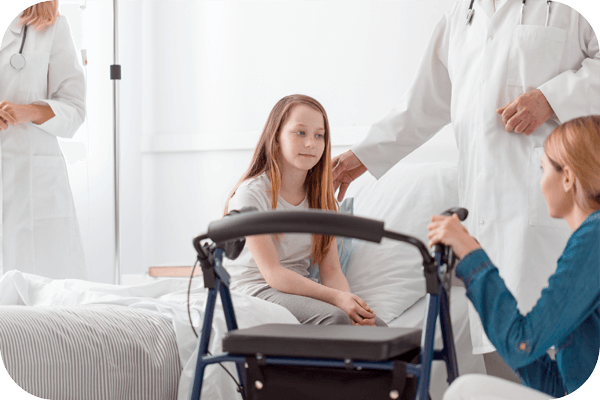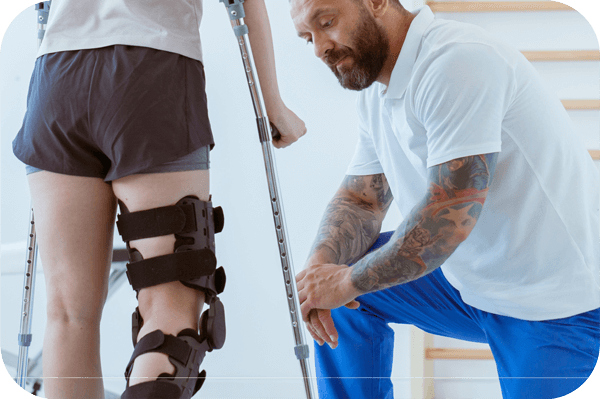Concussion
Concussion can be defined as a form of brain injury either by direct or indirect blow to the head, face, neck or elsewhere in the body resulting in an impulsive force transmitted to the head. The biomechanical forces typically result in rapid onset neurological impairments that are usually short-lived.
Concussion can have longer lasting effects that can go on for months, even years and this is known as post-concussion syndrome.


Common challenges:
-
Headache
-
Dizziness
-
Disorientation
-
Light sensitivity
-
Memory loss
-
Slowed movement
-
Reduced cognitive ability or concentration
-
Clumsiness
-
Poor sleep
-
Irritability
The role of a neurological physiotherapist in concussion management:
Neurological physiotherapists are physiotherapists with additional training and expertise in treating problems related to the brain, spinal cord, inner ear and nerves. Neurological physiotherapists apply their neuroscience knowledge to assess multiple aspects of brain function at a very detailed level. This accurate clinical picture will form the basis of an evidence-based strategy to treat an individual’s specific symptoms.
There is increasing evidence that complete rest following a concussion delays recovery times and often does not restore the highest levels of function. What is required is graded exposure to a range of stimuli and to build on the exercise tolerance. Treatment of eye movement and depth perception are also important in restoring balance and hand eye coordination. The neck will also need to be examined together with the vestibular systems to ensure that the sense of verticality and orientation are well tuned post-concussion. Seeking a consultation at a concussion physiotherapist can give you a better idea about the treatment and recovery.


What our skilled concussion physiotherapists can offer:
-
Thoroughly assess the individual’s neurological systems, in particular the neck, vestibular and autonomic systems and the interplay of these in balance and orientation
-
Understand the cognitive and emotional difficulties that an individual after concussion may have
-
Design a personalised neurological rehabilitation program that is holistic, graded and considers the 24-hour routine
-
Provide hands-on treatment to teach the individual how to move better or more efficiently
-
Teach strategies to cope with challenging environments
-
Liaise with the other health professionals, such as neurologists or psychologists as required to assist in your rehabilitation or health and well-being

Frequently Asked Questions
A concussion is a type of traumatic brain injury caused by a bump, blow, or jolt to the head or by a hit to the body that causes the head and brain to move rapidly back and forth. This sudden movement can cause the brain to bounce around or twist in the skull, creating chemical changes in the brain and sometimes stretching and damaging brain cells.
Symptoms of a concussion can include headaches, confusion, dizziness, ringing in the ears, nausea or vomiting, fatigue, and blurry vision. Some individuals may also experience sensitivity to light or noise, difficulty concentrating, and changes in emotional state. Symptoms can vary greatly between individuals and may not be immediately apparent.
If you suspect a concussion, seek medical attention immediately. It’s crucial to rest initially and avoid activities that could worsen your condition, such as physical exertion and screen time. A healthcare professional can provide a proper assessment and guide you on the necessary steps for recovery.
While most people recover fully from concussion, some may experience long-term effects, especially after multiple injuries or if the injury is more severe. These can include chronic headaches, memory problems, concentration issues, and in some cases, changes in personality or emotional difficulties.
The primary treatment for a concussion is a period of initial rest and gradual return to normal activities as symptoms allow. This includes both physical and cognitive rest. Healthcare providers may also recommend specific treatment for symptoms like headaches or insomnia. Following a tailored recovery plan is essential for healing.
Recovery time varies from person to person, depending on the severity of the concussion and the individual’s health history. Most people recover within 7 to 10 days, but it can take longer for some. It’s important to follow a healthcare provider’s advice and not rush back into daily activities too quickly.
While not all concussions can be prevented, wearing appropriate protective gear during sports and other activities, ensuring safe play and work environments, and following rules designed to keep activities safe can reduce the risk of a concussion.
The main difference lies in the severity and duration of symptoms. Concussions are considered mild brain injuries with typically short-term effects. More serious brain injuries can cause prolonged or permanent damage to brain function and require extensive medical treatment.
Supporting someone with a concussion involves ensuring they follow their recovery plan, helping them avoid activities that could exacerbate their symptoms, and providing emotional support. Physiotherapists are well-equipped to assess, screen and manage the symptoms linked to this type of brain injury to manage vestibular, visual, cervical and autonomic (blood pressure) changes following concussion.
Yes, children may exhibit different or less obvious symptoms than adults, such as changes in eating or sleeping habits, irritability, and loss of interest in favourite activities. It’s important for parents and caregivers to monitor closely and seek medical advice if a concussion is suspected in a child.



















































